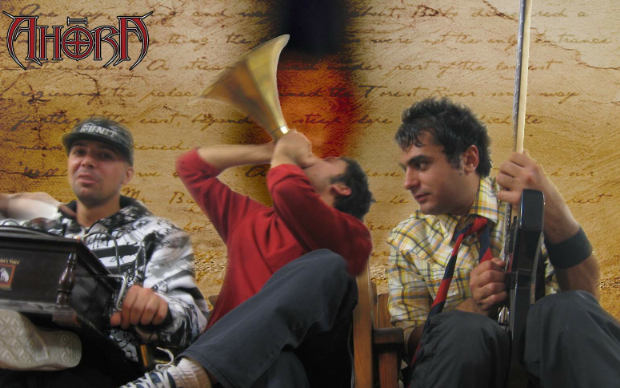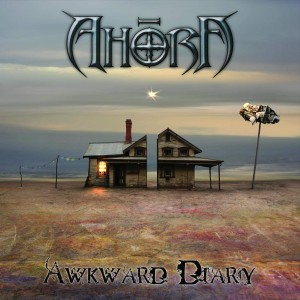Milad is a guitarist and songwriter in an eclectic Tehran-based band called Ahoora. The band’s name isn’t known in music industry circles that attend festivals with strategies to position their newly signed rock brands bands as rebels, but maybe it should. Playing metal in a country where the genre is essentially banned provides the truest perspective of rockers as outlaws. Metal of course isn’t singled out in Iran, many other types of Western music has been restricted commercially in the country for years. The classic Clash song Rock the Casbah was written as a response to these restrictions. For the most part, radio play, live performances, and the selling of music not approved by officials are all activities that are very difficult to accomplish- essentially making planning for these common goals illegal.

Ahoora has continued their journey in metal for the better part of a decade. Their perseverance, despite significant adversity due to circumstances in their home country, is paying off- at least online. Ahoora has been able to gain new fans by utilizing social networking sites.
They’ve also taken advantage of artist-centric services such as Reverbnation to connect to, and further foster relationships with, audiences. They’ve used its powerful tools to release their music which is currently for sale on the the band’s site as well as iTunes. Online media has taken note. They’ve attained coverage on metal fan sites based around the globe. Recently, Classic Rock Magazine recognized their new album, Awkward Diary, by describing its sound in this way: “Imagine Muse and Tool getting all cozy around Iced Earth…”
A Youtube video can be seen of Ahoora rocking out at a poorly lit and cramped show in their home country. For obvious reasons, live exposure isn’t a common occurrence for the band. However, due to their use of online tools, the band has been able to keep the music coming.
Milad, you’ve always lived in Iran, so how did you learn English?
Mostly by listening to music and watching movies.
Do you feel that there are language barriers in music?
No, I don’t think so. As a Persian, I don’t believe that rock music with Persian words could go very far. Personally, my experiences have taught me that there are no language barriers in terms of spreading music [for it to] carry into someone’s mind or heart.
How did you first get into metal? Who are your influences?
It was within high school. Before that, I’ve been a die-hard space rock fan. To name a few bands: Pink Floyd, Muse, Iced Earth, Black Sabbath, Porcupine Tree, Nevermore, Coroner, etc.
Please describe Ahoora’s sound?
We’ve always tried to be more original [for] each album. I think after two progressive thrash metal albums, our latest album “Awkward Diary” is more of a multi-genre kind of thing.
How did you come up with the name?
It was chosen eight years ago. We thought, “Cool, why not?!” In ancient Persian it means “pureness.”
Is there a metal movement in your country?
I’m not sure if we could call it a movement. But there are numbers of struggling musicians. There’s no real scene- no gigs or releases, so it’s hard to define it as a movement. A few years ago the situation was not this bad! There had been more rock/metal musicians.
Are there metal record labels in Iran?
No, there are not record labels for rock or metal music. After all, there are few labels running in the country.
I saw a performance of the band on Youtube. Are you able to talk about that?
Yes! It was a long time ago; our actual first official concert, which happens to be our last. Back then we were really into thrash metal, we didn’t have enough experience. Anyway, it was a great night. The second night was cancelled because the election was closing in.
Regarding music, can you describe the restrictions in your country?
It’s a long story! It’s hard to explain this, because it’s a massive subject. But almost there’s no tolerance about different ideas and different genres of music. I could say in terms of self expression, we’re way too restricted. Beside few real shallow scenes like Iranian folk/pop or traditional music, you could say no other genres really exist. But to put it simple, I must say there’s no freedom of opinion or expression here. There’s no tolerance towards anybody who thinks different. In regards to music, the scene is dead- almost all the genres. There’s no possibility to do what you need or want. Needless to say many things in press- TV, Internet, and cinema are censored or even never get made.
The government is the only TV host in Iran. So you could imagine what music is being played on television. You almost cannot show any instrument on TV.
Are bands arrested for performing?
There have been a few examples of bands being caught or arrested. To be honest it’s not so easy to describe the reasons- too much and also too deep: politics, culture, religion and many other basic factors have resulted in our current situation.
How are you able to get around these restrictions to perform and promote your music?
We cannot perform at all within Iran. About promoting, mostly the Internet. It is our only tool to promote our music and let the world know about Ahoora.
Can you sell your music in Iran?
There are no music stores with rock records, at least not legally. If we’re lucky, we could have it sold in one or two stores- black market of course.

Can you talk about the creation of your album?
I wrote the album in eight to nine months when I was doing my military service. Then, I started recordings in May (2009). I recorded half of the album in three months, but we were forced to stop due to a few personal problems and also the situation within the country. We were able to pick it in late September and finish the album by October, somewhere out of Tehran. We used our very primitive tools and instruments and did it in our home studios.
Is military service mandatory in your country? How long does that last?
Yes, it is mandatory for all the boys; almost two years.
Can you describe the experience of writing music that you’re not allowed to perform?
It’s been with me my entire music career; writing something that you cannot perform. I don’t think it’s possible to describe, it’s kind of strange. Maybe it’s really sad, but most of the times I don’t feel so. It’s the way it always has been for us.
I noticed that you use ReverbNation. How do you use this site and service?
We use ReverbNation and also Sonicbids, and many other databases and free music listings. We use it to create players, widgets and also to handle the mailing list. These new tools are really becoming essential for today’s music.
In what ways do you promote your music outside of the Internet?
We’ve had some magazine reviews and interviews. We’ve also had some airplay for our new single off the new album at US college radio stations, as well as podcasts.
Where have you been able to gain followers outside of Iran?
We’ve been warmly received through international media and also the people that we’ve had the chance to know. We’ve been able to make some very good friends from this distance. According to our Web site statistics, I could say mostly the United States.
In regards to staying connected, how important is the Internet to Ahoora?
It’s really vital. Without it, we’d be long dead and buried. We’ve been able to gather serious media feedback for our three albums. Now we can let the people know about our music. For our fans within the country, Internet is also very vital so they can get the latest about Ahoora; needless to say, the precious connections you could make are via Internet.
What are your goals?
Our major goal for 2010 is to get out of Iran and play. In order to survive we need to get out. The whole point is to be able to share your thing, and find some ears for it.
Visit Ahoora on their site.
– Israel Vasquetelle
Here’s an old video of the band performing in Iran:




